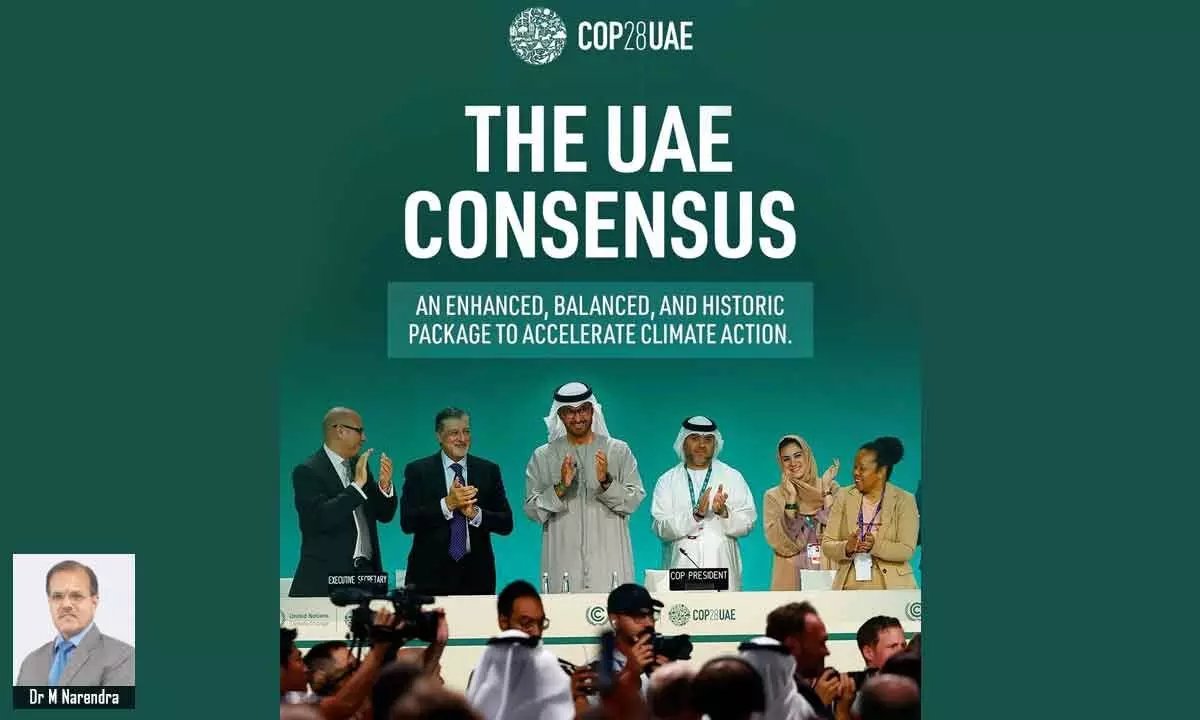Dubai COP28 has led to some tangible climate change decisions
The Presidency mobilized countries to seed the loss and damage fund with $792 million
image for illustrative purpose

In a good development, there was a consensus on attending to the health issues arising out of climate change. And the recognition of the need to take whole gamut of actions by involving all stakeholders for climate resilience and outcome of adaptation across sectors, including food and agriculture, water and sanitation, housing, urban planning, health care, transport and energy by prioritising and implementing adaptation across sectors that deliver positive health outcomes
The final UAE Agreement (UAE Consensus) marking the conclusion of COP 28 hosted in Dubai could not achieve the breakthrough that was eagerly anticipated. The members could not come to any unanimous agreement as regards phasing down of fossil fuels like oil, coal and gas. At the end of the deliberations, the eventual conclusion was in a gradual transition from fossil fuels and was declared as the ‘beginning of the end’ of the fossil fuel era. It lays the ground for a swift and equitable transition, underpinned by deep emissions cuts and scaled up finance.
It paved the way for the first ‘global stocktake’ in order to ratchet up climate action before the end of the decade- with the overarching aim to keep the global temperature limit of 1.5°C within reach.
UN Climate Change Executive Secretary Simon Stiell said" Whilst we didn't turn the page on fossil fuel era in Dubai, now all governments and businesses need to turn pledges into real economy outcomes."
It is a fact that without a clear roadmap and action plan, while substantially increasing the capacity for alternative energy, no nation can achieve net-zero emissions by 2050. The Global Stocktake recognises the science that indicates global greenhouse gas emissions need to be cut by 43% by 2030 compared to the 2019 levels.
However, many are off track when it comes to meeting their Paris agreement goals.
According to Dr. Sultan Ahmed Al Jaber, president, COP 28 UAE, "An agreement is only as good as it's implementation. The UAE Consensus is only the beginning of the road.”
COP 28 Presidency was able to mobilize countries to operationalise and seed the loss and damage fund with $792 million. Looking at the loss and damages already incurred by the least developed and developing countries in the recent past, the size of the fund is short of target and it calls for developed countries, who are responsible for earlier high green gas emissions, need to give to this fund more liberally to facilitate climate adaptation and mitigation action plans in the least developed countries. The extent of current global loss and damage is difficult to quantify. It is clear that there have been large scale damages, which can worsen with an increase in global warming.
As per the ‘Renewables and Energy Efficiency’ pledge the commitment is to triple RE installed capacity to 11000 GW by 2030 and double the energy efficiency improvements from to four per cent per year so that it can be first preferred fuel choice. Private sector players have announced $3 billion fund for clean power in emerging markets, while there is a need for $29.5 trillion by 2030 to achieve the targetted goal.
Many governments have decided on new regulations and over 50 O&G companies have committed to achieve a near-zero methane by 2030.
According to a BCG report, over 75% methane from O&G industry can be abated with existing positive NPV technology. Further, CH4 is 80× more potent than CO2 and accounts for 30% of global warming. Anthropogenic emissions must fall by 30-60% by 2030.
Another COP 28 achievement is the additional climate financial commitment of over $ 85 billion, including for energy ($6.8 billion), climate ($61.8 billion), lives and livelihood (£8.7 billion), inclusion ($ 1.7 billion), green climate fund ($ 3.5 billion), loss and damage ($792 million), Adap ($ 134 million, least developed countries ($129 million) and special climate fund to the tune of $ 31 million.
There is a requirement of an annual investment of $ 5-7 trillion towards greening the global economy by 2030. Hence it calls for collective action and delivering on the promises. It is binding on the developed nations to deliver on the goal of jointly mobilizing $100 billion in the context of meaningful mitigation action and transparency on implementation through 2025. This calls for doubling the adaptation finance and also the replenishment of Green Climate Fund, significant contribution to the Adaptation Fund and enhancing Loss & Damage Fund.
The other recommendations covered in G20 leaders declaration and other initiatives like the Paris Pact for People and Planet (4P) Bridgetown Initiative, Accra Marrakesh Agenda and African Leaders Nairobi Declaration on Climate and Call to Action need urgent implementation in respect of making available climate finance, finding restructuring debt burden of least developed and few developing countries, additional voluntary IMF Special Drawing Rights, Strengthening MDBs, including private capital mobilization, enhanced domestic resources mobilization, unlocking a highway of private finance, delivering high integrity carbon markets and credits.
In a good development, there was a consensus on attending to the health issues arising out of climate change. And the recognition of the need to take whole gamut of actions by involving all stakeholders for climate resilience and outcome of adaptation across sectors, including food and agriculture, water and sanitation, housing, urban planning, health care, transport and energy by prioritising and implementing adaptation across sectors that deliver positive health outcomes.
The outcome of COP 28 is a milestone as far as adapting Global Stocktake is concerned.
India's active participation at COP 28 and Prime Minister Narendra Modi gave the right call while stressing on the need for making available climate finance to the developing countries to achieve their climate ambitions and implement their NDCs.
(The author is former Chairman & Managing Director of Indian Overseas Bank)

